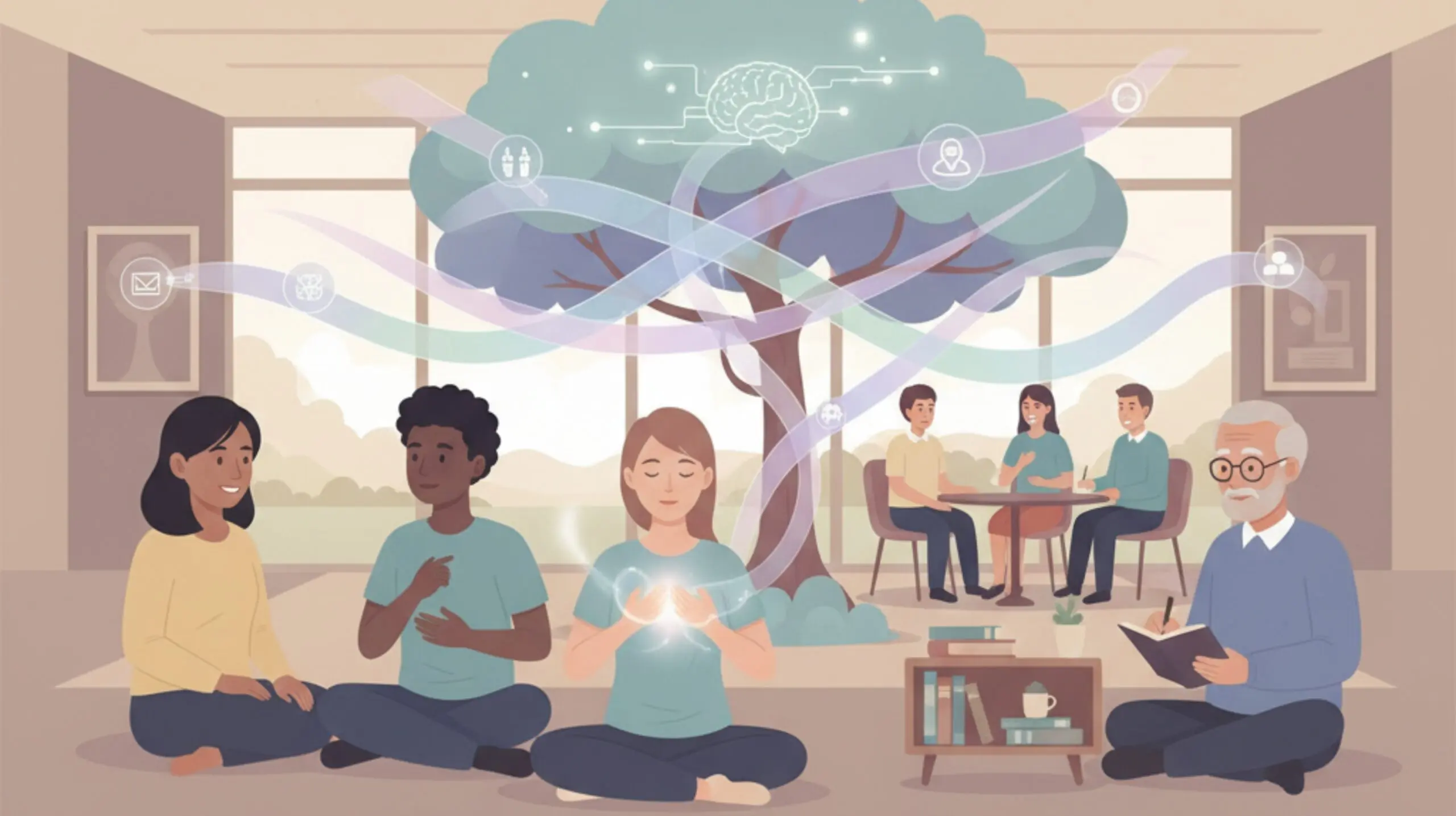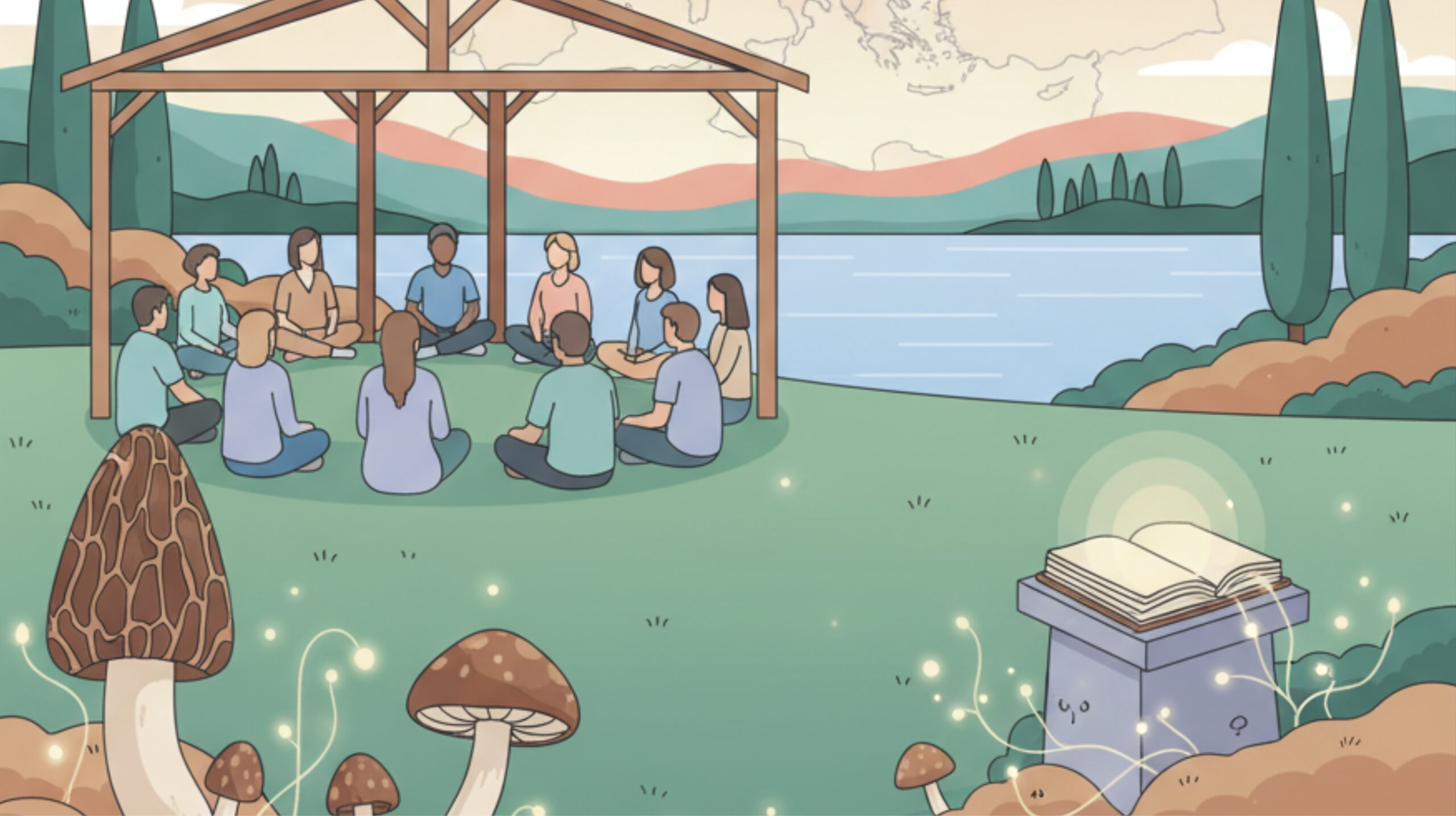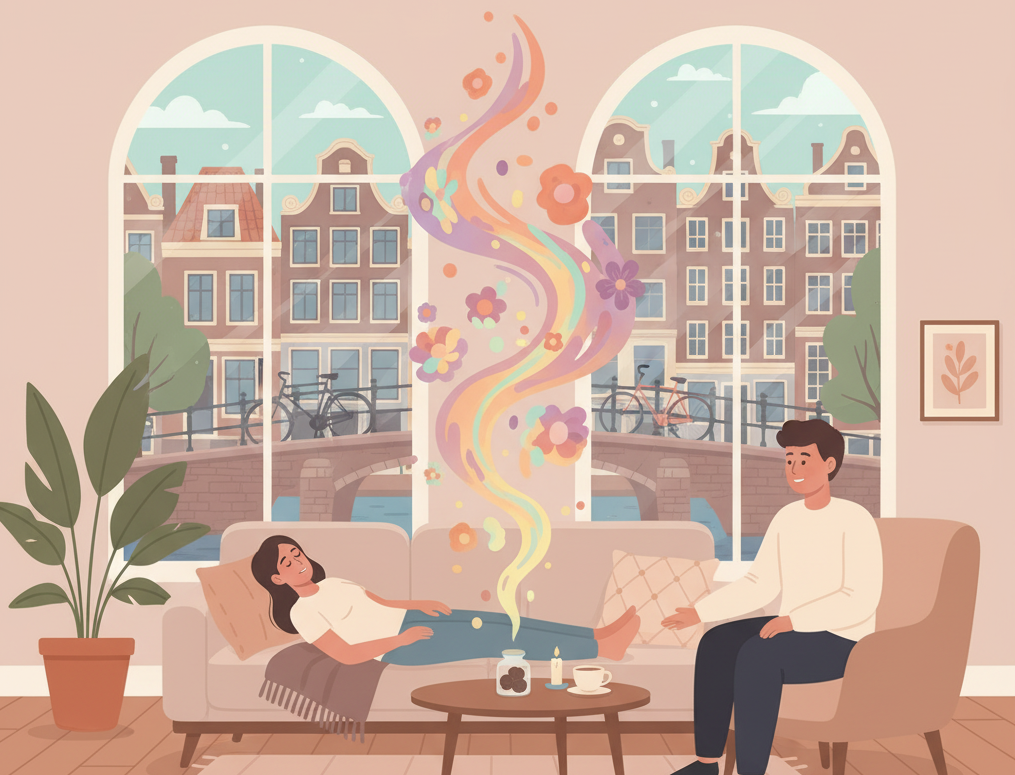
Psychedelic Therapy Amsterdam: Legal Options, Safety, and How to Choose
Quick answer: Is psychedelic therapy legal in Amsterdam?
The landscape of psychedelic experiences in Amsterdam exists in a fascinating legal gray area that often confuses visitors and locals alike. While psilocybin mushrooms have been banned in the Netherlands since 2008, psilocybin truffles—technically the sclerotia of the same fungi—remain legally available in smart shops throughout the city. However, it’s crucial to understand that these guided “truffle sessions” offered by various providers are not medical treatments unless they’re part of a regulated clinical study. They fall instead into the realm of coaching and wellbeing services, operating in a unique space between recreational use and therapeutic practice.
Understanding the legal landscape (Netherlands, 2025)
Mushrooms vs. truffles—what’s allowed
The distinction between mushrooms and truffles in Dutch law might seem arbitrary to outsiders, but it has created a unique ecosystem of psychedelic services in Amsterdam. When the Netherlands added psilocybin mushrooms to the Opium Act’s prohibited substances list in 2008, lawmakers specifically targeted the fruiting bodies of the fungi—what we typically recognize as mushrooms. The underground sclerotia, or truffles, which contain the same psychoactive compounds, remained outside this prohibition. This legal nuance has allowed smart shops to continue selling vacuum-packed truffles with names like “Philosopher’s Stones” and “Dragon’s Dynamite,” each varying in potency and effects.
This legal framework means that anyone over 18 can walk into a smart shop in Amsterdam and purchase truffles, but the reality of what happens next varies dramatically. Some people consume them recreationally in parks or canal-side benches—an approach that carries significant risks given the powerful nature of these substances. Others seek out guided experiences with facilitators who provide structure, safety protocols, and integration support, creating containers that more closely resemble therapeutic interventions without making medical claims.
What counts as “therapy” vs. coaching/wellbeing services
The distinction between therapy and coaching in the psychedelic space isn’t merely semantic—it carries significant legal and ethical implications. In the Netherlands, psychedelic-assisted psychotherapy remains confined to clinical research settings, where medical professionals follow strict protocols under regulatory oversight. The sessions available to the general public, even those led by experienced facilitators with mental health backgrounds, cannot legally be called therapy. Instead, they’re positioned as coaching, personal development, or spiritual experiences.
This boundary creates both opportunities and challenges. On one hand, it allows for innovation and accessibility in psychedelic work outside the slow-moving medical establishment. Facilitators can draw from diverse traditions—combining Western psychology with indigenous wisdom, somatic practices, and contemplative traditions. On the other hand, this unregulated space means that quality, safety standards, and ethical practices vary wildly between providers. Some facilitators bring decades of experience, comprehensive training, and robust safety protocols, while others may have completed only a weekend workshop before hanging their shingle.
Substances that are not legal in NL sessions
While truffles occupy their unique legal position, it’s important to understand that other psychedelic substances remain firmly illegal for use outside clinical trials in the Netherlands. MDMA, despite showing remarkable promise in treating PTSD in clinical studies, cannot be legally administered in coaching or wellness contexts. The same applies to LSD, ayahuasca, 5-MeO-DMT, and other psychedelics that have gained attention in recent years. Some underground facilitators do offer sessions with these substances, but participating carries legal risks for both providers and participants, not to mention the additional safety concerns of working with unregulated substances of unknown purity and dosage.
What a safe truffle ceremony looks like
Screening, preparation, set/setting, facilitation credentials
A responsible truffle ceremony begins long before anyone ingests anything. Reputable facilitators conduct thorough screening processes, not to exclude people arbitrarily, but to ensure safety and appropriateness. This screening typically explores medical history, current medications (particularly SSRIs and MAOIs which can interact dangerously with psilocybin), mental health conditions, and personal intentions. Facilitators should be transparent about their training, experience, and approach, providing references when requested.
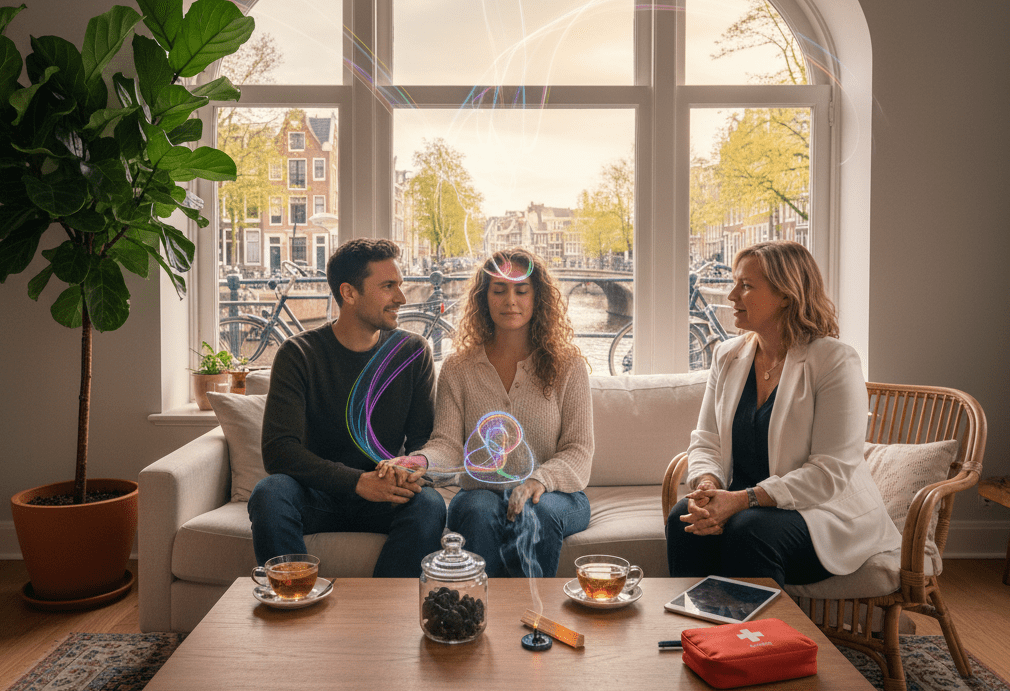
The concept of “set and setting”—one’s mindset and physical environment—forms the foundation of safe psychedelic experiences. Professional facilitators invest considerable energy in creating supportive environments, whether that’s a cozy living room with carefully chosen music and soft lighting, or a countryside retreat center surrounded by nature. They guide participants through preparation practices that might include meditation, breathwork, journaling, or somatic exercises designed to help people clarify intentions and develop resources for navigating the experience.
Dose ranges, session flow, and aftercare at credible providers
Dosing represents one of the most critical safety considerations in truffle work. Responsible facilitators start with conservative doses, especially for first-time participants, understanding that people’s sensitivity to psilocybin varies dramatically. A typical session might begin with 10-15 grams of fresh truffles for a moderate experience, though some therapeutic protocols use higher doses for deeper work. The session itself usually unfolds over 4-6 hours, with facilitators maintaining a supportive presence—available when needed but not intrusive, skilled at helping people navigate difficult moments without unnecessarily intervening in the natural flow of the experience.
The immediate aftercare phase deserves as much attention as the ceremony itself. Quality providers ensure participants have adequate time to ground and integrate before returning to everyday life, offering light meals, continued support, and initial integration conversations. They maintain clear boundaries while remaining available for follow-up questions or concerns in the days following the session, understanding that the real work often begins as people attempt to integrate insights into their daily lives.
Integration: why it determines most of the long-term value
Integration—the process of making meaning from and embodying insights from psychedelic experiences—arguably matters more than the experience itself. Without proper integration support, even the most profound realizations can fade like dreams, leaving people with beautiful memories but little lasting change. Professional facilitators understand this and build robust integration frameworks into their offerings, whether through follow-up sessions, group integration circles, or connections to ongoing therapeutic support.
At Beckley Retreats, we’ve structured our programs around this understanding, offering six weeks of integration support following our ceremonies. This isn’t an add-on or afterthought but rather the container that allows insights to take root and flourish in participants’ lives. Integration might involve processing emotional material that arose, implementing new behaviors or perspectives, navigating relationship changes, or simply learning to maintain the sense of openness and connection many people discover in psychedelic states.
Costs, venues, and who it’s for
Typical price ranges in/around Amsterdam
The cost of guided truffle experiences in Amsterdam varies enormously, from €200 for a basic group session in someone’s apartment to €2000 or more for private, multi-day experiences with extensive support. Most individual sessions with qualified facilitators fall between €500-1000, while group ceremonies typically range from €300-600 per person. These prices reflect not just the session itself but the screening, preparation, and integration support that responsible providers include. When evaluating costs, it’s worth considering what’s included—a bargain session with minimal support may prove costly in other ways if it leaves you struggling to integrate a difficult experience.
Who shouldn’t attend, when to seek medical support
Despite growing enthusiasm for psychedelic experiences, they’re not appropriate for everyone. People with a personal or family history of psychosis or bipolar disorder face elevated risks and should generally avoid psychedelics outside carefully monitored clinical settings. Those taking certain medications, particularly MAOIs or lithium, face dangerous interaction risks. Pregnant or nursing mothers should abstain, as should people with certain heart conditions or uncontrolled high blood pressure.
Beyond these medical contraindications, timing matters. People in acute crisis, experiencing severe depression or suicidal ideation, or dealing with fresh trauma may find psychedelics destabilizing rather than helpful without proper clinical support. If you’re unsure whether a truffle experience is appropriate for you, consulting with a knowledgeable healthcare provider—ideally one familiar with psychedelic medicine—can provide valuable guidance.
Truffle ceremony vs. clinical psychedelic therapy (what’s the difference?)
The distinction between truffle ceremonies and clinical psychedelic therapy extends far beyond legal categories. Clinical therapy involves medical professionals working within established protocols, with standardized dosing, validated assessment measures, and regulatory oversight. These treatments target specific diagnoses—PTSD, treatment-resistant depression, end-of-life anxiety—with clear outcome metrics and safety monitoring. The therapists involved have extensive training not just in psychedelic work but in treating the conditions they’re addressing.
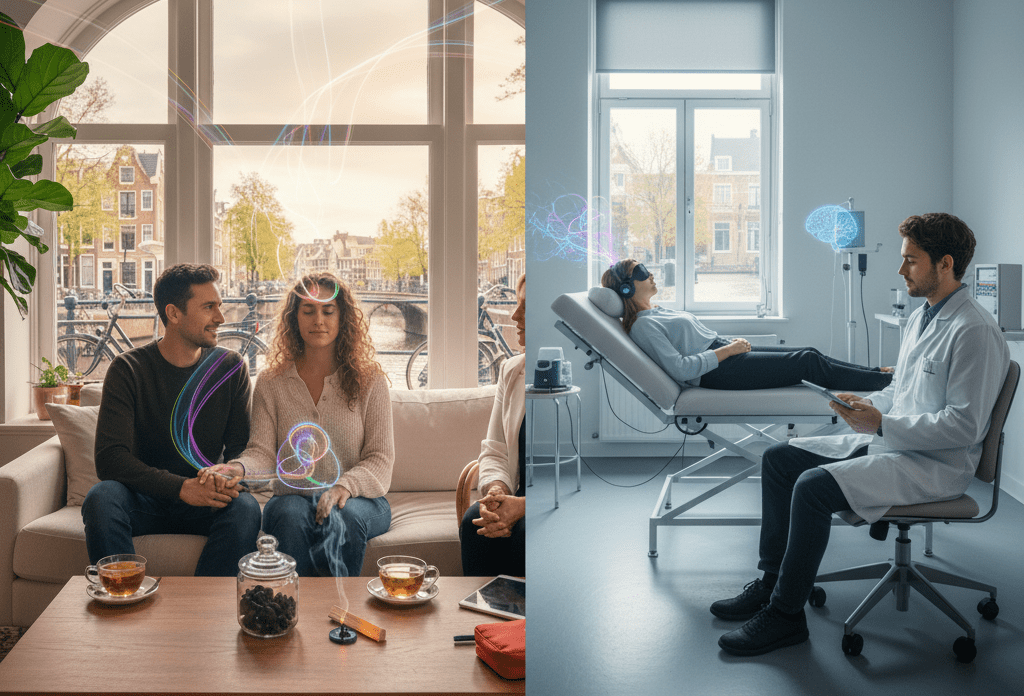
Truffle ceremonies, by contrast, operate in the wellness and personal development space. Facilitators may have diverse backgrounds—from psychology to bodywork to shamanic traditions—but they cannot diagnose conditions or claim to treat medical issues. The experiences tend to be more open-ended, focusing on personal growth, spiritual exploration, or general wellbeing rather than symptom reduction. This isn’t necessarily a limitation—many people find tremendous value in experiences that don’t fit the medical model—but it’s crucial to understand what you’re signing up for and adjust expectations accordingly.
How to choose a safe, ethical provider
Due-diligence checklist
Selecting a facilitator for a truffle experience requires careful consideration and shouldn’t be rushed. Start by researching their background and training—not just in psychedelic work but in relevant supporting fields like psychology, counseling, or somatic therapy. Ask about their experience: How many sessions have they facilitated? What’s their approach to difficult experiences? How do they handle medical emergencies? Request references from past participants and actually follow up on them.
Examine their screening and preparation process. Facilitators who rush you into a session without adequate screening or preparation may be prioritizing profit over safety. Look for clear communication about what’s included, what’s expected of you, and what support is available afterward. Pay attention to how they discuss the experience—those making grand promises or medical claims should raise red flags, while those who speak honestly about both potential benefits and risks demonstrate integrity.
Questions to ask before booking
Before committing to any facilitator, ask pointed questions: What’s your training background? How do you screen for safety? What’s your emergency protocol? How many assistants will be present? What kind of integration support do you offer? How do you handle challenging experiences? Can you provide references? What’s your cancellation policy? How do you maintain participant confidentiality? The way facilitators respond—whether they’re transparent and thorough or evasive and defensive—tells you everything you need to know about whether to trust them with your consciousness.
Considering a deeper container? Why many seekers choose a legal retreat
While Amsterdam’s truffle ceremonies offer accessible entry points into psychedelic experiences, many people seeking deeper transformation find value in more comprehensive retreat settings. The urban environment, with its inherent distractions and the need to navigate city life immediately after a profound experience, isn’t always conducive to the kind of deep inner work these medicines can facilitate. This is where structured retreat programs, like those offered by Beckley Retreats in Jamaica’s legal psilocybin framework, provide distinct advantages.
Our Prepare-Immerse-Integrate model extends the container far beyond a single ceremony, beginning with thorough preparation that helps participants develop resources and clarity, continuing through carefully held ceremonies with experienced facilitators and medical support, and extending into six weeks of integration programming. This comprehensive approach, grounded in both neuroscience research and contemplative practices, creates conditions for lasting transformation rather than temporary insights. The retreat setting itself—removed from daily life’s demands and surrounded by natural beauty—allows for the kind of sustained introspection and community connection that can catalyze genuine change.
FAQs
Are magic truffles legal in Amsterdam?
Yes, psilocybin truffles remain legal for adults to purchase in smart shops throughout the Netherlands, though psilocybin mushrooms have been prohibited since 2008.
Can I get prescription psychedelic therapy in the Netherlands?
Prescription psychedelic therapy is only available within clinical research trials. The guided truffle sessions available to the public are coaching or wellness services, not medical treatments.
Is it safe to combine truffles with antidepressants?
Combining truffles with certain antidepressants, particularly SSRIs and MAOIs, can be dangerous. Always consult with a healthcare provider before using psychedelics if you’re taking any medications.
What’s the difference between a coach-led session and a clinical trial?
Clinical trials involve medical oversight, standardized protocols, and treatment of specific diagnosed conditions. Coach-led sessions focus on personal development and wellbeing without making medical claims.
Can tourists purchase truffles?
Yes, adults over 18 can legally purchase truffles from smart shops regardless of nationality, though consuming them safely requires proper preparation and ideally professional guidance.
How do I prepare and integrate well?
Quality preparation involves clarifying intentions, developing coping resources, and understanding what to expect. Integration requires ongoing support to process and embody insights, whether through therapy, coaching, or structured programs.
The landscape of psychedelic experiences in Amsterdam continues evolving as research advances and cultural attitudes shift. Whether you’re drawn to a local truffle ceremony or considering a more comprehensive retreat experience, approaching these powerful experiences with respect, preparation, and appropriate support remains paramount for safety and benefit.
